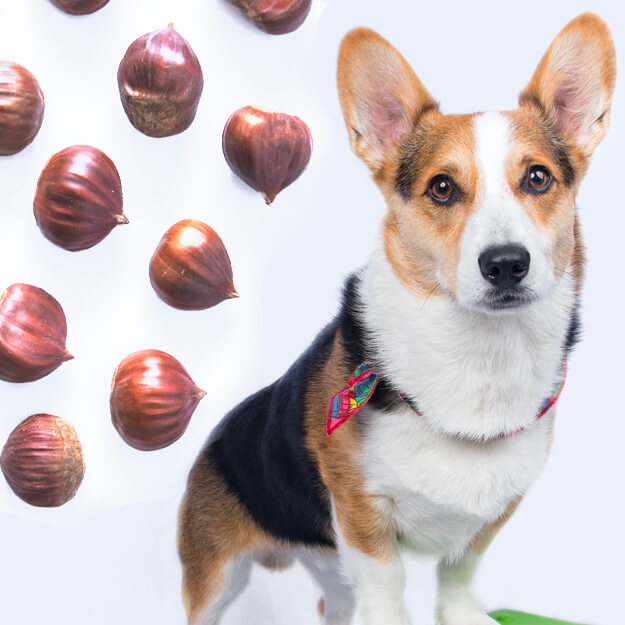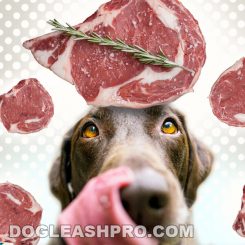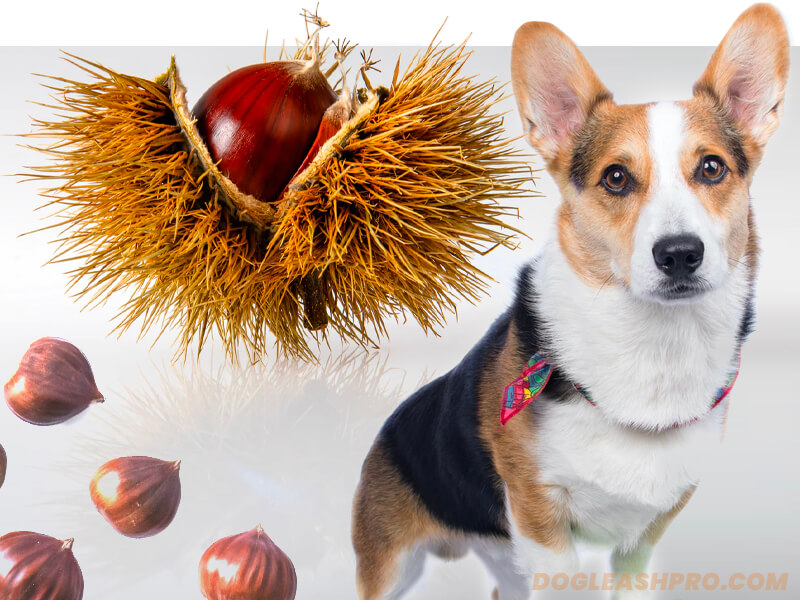
Chestnuts are a delicious snack for many people (and dogs) during the autumn, winter, and holiday seasons. The warm smell of comfort fills your home while you’re roasting Chestnuts in your fireplace. Perhaps you’re eating water Chestnuts and wondering if they are good or safe for dogs to eat. Here’s the short answer.
Can dogs eat Chestnuts? Yes, dogs can eat Chestnuts in moderation. The nuts are considered healthy for your dogs as they are packed full of fiber, protein, vitamins, and omega-3 fatty acids. However proper preparation is key before consumption to avoid any potential choking hazard or sodium ion poisoning in dogs.
In this article, we’ll discuss what type of Chestnuts your dogs can eat and how to prepare them properly so everyone (including your furry family members) can enjoy them. Your K9 friends may enjoy the Chestnuts a lot so be careful with how much you’re giving them. Like many seeds or nuts, store-bought Chestnuts are usually drenched with salt for flavor.
Table of Contents
Are Chestnuts good for dogs?
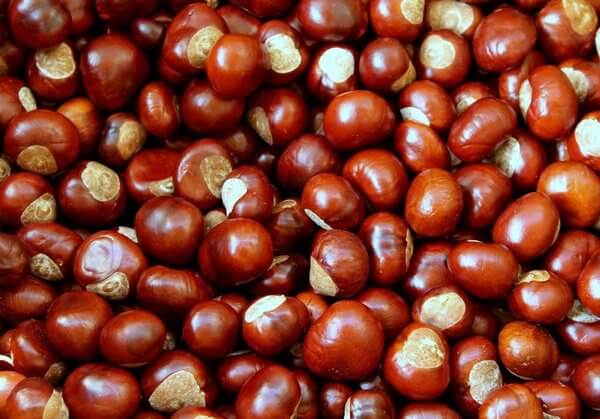
Yes, in small quantities, Chestnuts are good for dogs. Make sure they are not pre-cooked as those Chestnuts are prepared for humans with added salt and sugar for flavoring.
Chestnuts are high in fiber so they can help your dog’s digestive system function properly and avoid diarrhea or constipation.
According to the US Department of Agriculture, 1 cup of Chestnuts contain:
- 7.29 grams of Fiber.
- 4.53 grams of Protein.
- 3.15 grams of Fat.
- 847 mg of Potassium.
- 47.2 mg of Magnesium.
- 41.5 mg of Calcium.
- 37.2 mg of Vitamin C.
- 2.86 mg of Sodium.
- 1.3 mg of Iron.
- 0.711 mg of Vitamin B-6.
As you can see Chestnuts are rich in potassium which helps improve brain and heart functions, control nerve impulses, and regulate muscle activity. They are low in fat so you don’t have to feel guilty when giving your pup those delicious Chestnuts as a special treat.
37.2 mg of Vitamin C. Yes, you read that correctly. Vitamin C is an antioxidant and chestnuts are the only type of nuts that has vitamin C. If you have older dogs with joint pain, vitamin C helps reduce inflammation and slow down cognitive aging.
Best of all, it’s packed with omega-3 fatty acids which can improve your dog’s skin, coat, joints, and also boost his energy level. One of the three main omega-3 fatty acids in Chestnuts is DHA or docosahexaenoic acid, which helps with proper eye and brain development in dogs. It can also slow down cognitive aging and improve chronic kidney disease in older dogs.
Are Chestnuts bad for dogs?
Chestnuts are bad for dogs if they contain too much added salt. Many store-bought Chestnuts are saturated with salt or even sugar for flavoring to satisfy and please the human palate.
Accidentally eating Chestnuts doused with sodium can cause sodium ion poisoning in dogs leading them to dehydrate. Some of the symptoms you’ll see are excessive thirst, excessive urination, diarrhea, vomiting, lethargy, and even coma.
Additionally accidentally eating too many Chestnuts can cause gastrointestinal distress since Chestnuts like cheese balls or cheese puffs contain starch which can be hard for canines to digest properly. Too much starch and your pooch can start to vomit, have an upset stomach, or have diarrhea.
In the worst-case scenario, too much starch can also cause pancreatitis. So be sure to feed your pup a small number of Chestnuts once a week.
While Chestnuts may appear small in size, they could be a choking hazard for many small to medium-sized dogs. Before you give these savory Chestnuts to your four-legged friends, make sure you’re preparing them correctly and the shell is peeled off.
It’s best to cook them first and break them up into small pieces before giving them to your canine companions. Not only are raw Chestnuts hard to chew, but also a choking hazard. If your dog accidentally swallows a whole Chestnut, it can get stuck in his throat, stomach, or even intestines.
We recommend visiting the veterinarian immediately if your pooch is having negative reactions from eating Chestnuts. It’s also a good idea to contact your vet if your furry friends consume way too many Chestnuts, or are having digestive issues.
Chestnuts and Dogs
There are a few types of Chestnuts out there: Chestnuts, Water Chestnuts, and Horse Chestnuts. They all have their distinct taste and texture.
We’ve discussed above that Chestnuts are good for dogs in moderation. But what about Water Chestnuts and Horse Chestnuts? Let’s go over them in detail next.
Can dogs eat Water Chestnuts?
Yes, dogs can eat water Chestnuts in moderation as long as they are fresh and not from a can.
What are Water Chestnuts?
You’re probably wondering what the difference is between Chestnuts and Water Chestnuts. While both share the name “Chestnut,” it’s important to point out that Water Chestnuts and Chestnuts are actually not related. You can’t substitute Water Chestnuts for Chestnuts and vice versa.
Here are the differences between the two.
| Chestnuts | Water Chesnuts |
| -Are considered nuts as they are also known as tree Chestnuts. | -Are not considered nuts, but are corms. |
| -Grown in the US, Asia, and Europe. | -Grown in Southeast Asia only. |
| -Encased in capsules that are spiky. | -Grows underground and flourish in marshy, wet fields. |
| -Each shell contains 2 to 7 nuts. | -The brown skin of Water Chestnuts looks similar to the skin of tree Chestnuts. |
| -Inedible when the Chesnuts are raw. | -The meat of the Water Chestnuts has an apple-like, crispy texture. |
| -Taste sweet when boiled or roasted in their shells. | |
| -The meat of the tree Chestnuts has a meatier, starchier texture. |
You will usually find jarred or canned Water Chestnuts at your local grocery store since fresh ones are harder to find. However, canned Water Chestnuts are bad for dogs because they contain high levels of sodium that is dangerous for dogs.
Our canine friends are extremely sensitive to salt. In fact, in their daily diet, they only need a small amount of salt: 0.25 grams to 1.5 grams of salt for every 100 grams of their food. Any salt intake over this amount can cause sodium poisoning in dogs.
Since Water Chestnuts can also taste very starchy to our canine pups, they may not even like the taste and will spit it out. If your pooch does enjoy Water Chestnuts, go ahead and only give a small amount or in moderation.
Eating a lot of water Chestnuts can give your pup an upset stomach.
How to prepare and feed your dog Chestnuts
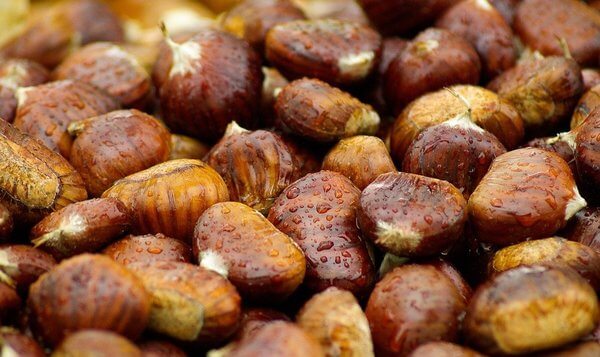
Chestnuts should not be the main source of food for your dogs. Instead, it should only be used as an occasional treat once a week and up to 5 Chestnuts depending on the size of your pooch. If your pup loves it so much, you can crumble small pieces of Chestnuts over their meal as a topper.
Chestnuts are best after they have been cooked or roasted and left to cool down for a few minutes. Do not add any flavor and plain is best.
Here’s how to feed your dog Chestnuts:
- Get a cooked or roasted Chestnut and peel away the hard skin.
- Use your if the Chestnut crumbles easily and break it into small chunks.
- Alternatively, use a knife to cut the Chestnut into smaller pieces.
- Feed your anxiously waiting pup small amounts of Chestnuts.
Again, avoid pre-cooked Chestnuts as those are prepared for humans with added flavors like salt or sugar. Be sure to keep all Chestnuts out of your dog’s sight. Keep them on a higher shelf so your furry companions can’t reach them or in the refrigerator.
On walks in the woods or near Chestnut trees, keep an eye on your four-legged companion so they don’t accidentally eat or have any Chestnut.
Key Takeaways
Dogs can eat Chestnuts as long as they are used for occasional treats once a week. Chestnuts provide many beneficial minerals and nutrients for dogs including fiber, protein, vitamins, and omega-3 fatty acids. They are also low in fat which makes them the perfect treat for dogs that are overweight.
Avoid raw whole Chestnuts and make sure your canine friend does not accidentally consume one when out walking. Always cook or roast the Chestnuts first and break them into smaller pieces before feeding them to your pup.
If your furry friend is trying Chestnut for the first time, make sure to give just a small amount and see how they react to them. Check for reactions like constipation or diarrhea, it’s best not to give them any more Chestnuts. If your dogs are fine with Chestnuts, go ahead and give them a moderate amount.
Common Questions
Yes, dogs can eat roasted Chestnuts as long as they are plain with no added flavor like salt. Again, only give your dog a small amount and in moderation.
Yes, dogs can absolutely eat cooked Chestnuts. Be sure you are cooking them yourself and you’re not adding in any flavors like salt. By cooking the water Chestnuts yourself, you know what is in your dog’s food.
Absolutely not, dogs should not eat raw Chestnuts because they contain a high level of tannic acid content which can damage your dog’s liver and kidneys. If your dog accidentally eats raw Chestnuts, he may have abdominal pain, diarrhea, lethargy, and even vomit. Raw Chestnuts also have a hard shell. When dogs chew on it, they can turn sharp and can cut your dog’s mouth, tongue, or throat.
Absolutely not, dogs should not eat horse Chestnuts. Horse Chestnuts contain a toxic substance called aesculin which can cause disorientation, gastrointestinal distress, and muscle spasms in dogs. Some of the symptoms of horse Chestnut poisoning in dogs include excessive drooling, diarrhea, vomiting, and paralysis.
DISCLAIMER: THIS WEBSITE DOES NOT PROVIDE MEDICAL ADVICE
The information, including but not limited to, text, graphics, images and other material contained on this website are for informational purposes only. No material on this site is intended to be a substitute for professional veterinary advice, diagnosis, or treatment. Always seek the advice of your veterinarian or other qualified health care provider with any questions you may have regarding dietary needs.
Resources:
https://www.outdoorlife.com/8-common-wild-plants-that-are-poisonous-to-your-dog/
https://en.wikipedia.org/wiki/Chestnut

With over five years of specialized experience as an animal writer, my expertise lies in dog nutrition, health, behavior, grooming, and training. I am dedicated to delivering helpful and informative content that caters to the well-being of our furry friends. My primary goal is to empower pet owners with knowledge and ensure our canine companions thrive in health and happiness. In my free time, I love volunteering at local dog rescue centers.
